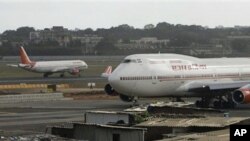India's commercial capital, Mumbai, has moved closer to breaking ground on a second international airport, with a major political compromise on environmental concerns that have delayed the project. The episode underscores India's growing need for both infrastructure and ecological balance as it becomes a major economic power.
Monday's announcement by Indian Environment Minister Jairam Ramesh is a breakthrough following years of negotiations on a proposed second international air hub for the city of Mumbai.
"We have bargained, we have negotiated, and we have compromised," Ramesh said. "The result is an environmentally safe and ecologically sound, energy efficient international airport in Mumbai."
Mumbai, the capital of India's Maharashtra state, is seen as the urban epicenter of the country's emergence as a world power. It was President Obama's first stop when he visited India earlier this month.
Its current air hub, Chhatrapati Shivaji International Airport, can handle about 40 million passengers a year. Air traffic experts say that capacity is nearly exhausted.
The proposed second hub, the Navi Mumbai International Airport, about 20 kilometers from the city center, was planned to begin operations next year. That target was delayed by a list of environmental concerns: chief among them, the apparent need to divert the nearby Gadhi river.
Ramesh said that problem has been solved by redesigning the proposed airport with the two main runways closer together.
"The river Gadhi will not be diverted. So on this, from an environmental perspective, I think the score is 100 percent."
Ramesh adds compromises were necessary, however. A 90-meter high mountain near the site will need to be removed to allow an easier approach for airplanes.
Some are also questioning whether the government can uphold its promise of preserving hundreds of kilometers of mangroves in the area of the proposed airport.
The Indian environment ministry has laid out 32 separate conditions for builders to uphold, and Ramesh said the central government is now "fully on board" with the project moving forward.
"I think now the process of selecting the private sector partner, the process of improving connectivity through the international airport, can begin," he said.
Planners say the new Mumbai airport may now be ready as soon as the year 2014, absorbing up to 10 million air passengers in its first year of operation.
India Makes Strides Towards Second Mumbai Airport




